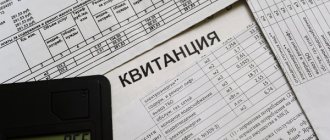Many believe that a situation where you can find yourself on the street without your own home will never affect them. But in fact, under certain circumstances, this can happen to almost every citizen. This is a rather unpleasant and scary situation, but, unfortunately, it occurs quite often.
- Evict your ex-husband or wife from the apartment
- Eviction from a non-privatized apartment
- Eviction of tenants after purchasing an apartment
- Eviction of tenants from a rented apartment
- Eviction from an apartment for debts to the bank
- Eviction from an apartment for debts on utility bills
- How to evict neighbors
If we delve deeper into the legislation of the Russian Federation, and more specifically, into the Housing Code, then there may be several options for developing a legal eviction scenario. Much also depends on who exactly will be deprived of housing space (owner, tenant, age indicators). Therefore, each situation has its own characteristics and solutions. Let's consider possible options for eviction from an apartment provided by law.
Eviction upon divorce
Of course, with any divorce there is a question of eviction, but very often in our practice legal cases arise when a husband evicts his ex-wife from an apartment and vice versa. This is the most common cause of conflict in eviction cases. The situation in legal practice, when after a divorce a husband or wife remains homeless, may have several main reasons:
- the housing meters belonged to one of the spouses before the official marriage;
- The apartment is not privatized.
The first situation is considered the easiest. But here, too, several possible outcomes are possible. In fact, if one of the spouses had their own apartment before the official registration of marriage, then the other half has no legal rights to it . And after the court’s decision on divorce, the law will be on the side of the homeowner and the decision to evict is inevitable. But it can also have several options. Basically, these decisions consist of delaying the time of eviction of registered tenants. The court, when considering a case, takes into account many factors, and it is they that influence the final verdict. For example, it is very important how long the spouses lived together before the divorce, the presence of minor children, and the health status of the former other half.
The financial support of the evicted spouse may also be an important factor for deferment.
If at a given time his (her) finances do not allow him to rent housing, and he does not have his own square meters, then the execution of the decision to evict may be delayed for a period of one to three years.
It is quite difficult to say about the specific result of the court hearing on this issue. Since each situation has its own nuances that may affect the court’s decision. But in any case, the outcome is the same - the eviction of the ex-husband or ex-wife. Moreover, this decision applies to all possible relatives from the other side assigned to this living space. There are situations when the court obliges to find and pay rent to an ex-wife or husband. But usually this may apply to cases where there are alimony obligations and financial security allows this step to be taken.
If we are talking about expelling a tenant from a non-privatized apartment, then resolving the issue will be a little more complicated. In such a situation, each spouse has the same rights to living space. Since a non-privatized apartment implies that all residents registered in it bear equal responsibility for paying utility bills and maintaining the housing in order.
The court may decide to evict one of the former spouses from a non-privatized apartment in the following cases:
- if payment for housing and communal services is not made;
- actual non-residence on the territory.
But to prove this, it is necessary to provide the court with very strong arguments. Only after collecting the necessary documents and evidence can you file a lawsuit for the forced eviction of one of your former spouses.
It is very important to note one of the factors - the presence of minor children . This moment may make its own adjustments. The basic principle is:
If children under 14 years of age are registered in the living space, they cannot be forcibly evicted.
Debt notice
Before carrying out evictions for debts on utility bills and taking away living space, they are required to warn about this in writing. In addition, interest accrued for non-payment will be taken from the amount of debts - penalties. Therefore, it is best to pay debts on time so as not to have any problems with litigation later.
The homeowner has nothing to fear - it is impossible to evict him from the apartment, but at the same time, you should not abuse this and pay everything as required by law.
Non-privatized housing. Is eviction possible?
In situations where there is a need to evict from a non-privatized apartment, it is important to find a convincing reason why such a procedure is possible and collect the necessary package of documents and witness testimony.
The main reason for such an eviction may be the death of a person, long-term residence abroad, etc. You can describe your specific situation to our lawyer online, who will answer your questions free of charge regarding the eviction of a tenant from a non-privatized apartment.
Eviction procedure
Reasons for eviction, according to Article 90 of the Housing Code of the Russian Federation - debt arises, which amounts to more than 6 continuous months. Those. there is a fact of non-payment, which is not included in the list of valid services. Such reasons apply to owners of residential premises rented under a social tenancy agreement and living in a dormitory.
Local authorities file a claim with the court, asking to evict the defaulter. If the claim is satisfied, the plaintiff must provide a court decision and only after that the eviction procedure can begin. It contains information about the defendant (full name), residential address and deadlines for vacating the occupied living space. If the homeowner does not want to move out of the apartment, bailiffs forcibly help them vacate the occupied premises.
Eviction of tenants after purchasing a home
Sometimes the joyful event of buying a new apartment can burden the presence of residents registered in it. This happens when there is an illiterate approach to the purchase and sale process. But this issue is resolved quite easily, since the Civil Code of the Russian Federation clearly regulates that:
Registration of purchase and sale automatically terminates the rights to use the housing of previous family members.
Therefore, feel free to go to court with an application for the forced eviction of the remaining tenants. But even here, protracted court cases are possible if these are minor children. Therefore, in order not to end up in a heap of lawsuits after purchasing an apartment, you should make sure for yourself that there are no registered tenants.
Procedure for eviction from an apartment for debts
Eviction for rent arrears is possible only on the basis of a court decision. If a person does not pay utility bills within a year, the owner files a claim in court, documenting his demands.
Based on a court decision, tenants are subject to eviction. Eviction is only possible for persons who live under the terms of social rent or a tenancy agreement.
Sample statement of claim
It is necessary to draw up a claim taking into account the provisions of the Code of Civil Procedure of the Russian Federation. A sample statement of claim for eviction from an apartment for non-payment of debts must contain the following information:
- name of the court;
- details of the plaintiff and defendant, their residential address;
- plaintiff's claims;
- confirmation of the stated requirements by the law;
- applicant's signature.
When submitting an application, please note that the court evaluates whether the entire package of documents has been provided, and then makes a decision to accept or refuse a decision.
Here you can download a sample statement of claim for eviction for debt.
Required documents
The application must be accompanied by documents that are evidence of the stated requirements and also confirm the identity of the applicant.
These include:
- a copy of the purchase and sale or rental agreement;
- receipt of payment of state duty;
- an extract from the house register, which indicates the composition of the persons registered in the apartment;
- witness statements;
- protocol for violating the rules of residence;
- certificate of debt.
Eviction of tenants without an agreement is carried out with the help of a local police officer or police. Don’t know how to evict an alcoholic neighbor from a communal apartment? Read here.
How to evict a wife from a privatized apartment after a divorce? Read more in this article.
Rented housing: real reasons for eviction of tenants
If for some reason the tenant refuses to check out of the rented apartment, then you can file a lawsuit in court to force him to evict him.
There may be several possible reasons for eviction. And the decision of many of them depends on whether the apartment rental document was officially drawn up, and what points were taken into account in it.
If the agreement concluded between you is legally correct, then it is quite easy to expel the tenants from the apartment ahead of time if they violate the terms of the lease. For example, the reason for eviction may be late payment, inappropriate behavior of tenants, poor attitude towards property, drunkenness, etc. But it is important that the reason for which the owner intends to expel the guest is specified in the contract. This course of the case allows us to speak of an almost 100% positive resolution of the issue in favor of the landlord.
If you are planning to sell a living space whose lease period has not yet expired, then you should amicably discuss the issue of possible discharge of tenants ahead of schedule. The legislation of the Russian Federation (Article 675 of the Civil Code) says that a change in the owner of housing is not the reason for termination of the rental agreement .
In what other cases can eviction be carried out?
It is difficult to seize housing from the owner, even in cases where any rules are flagrantly violated. In the case of people living in a privatized apartment, this can be done when:
- It is confiscated for state purposes, into municipal ownership. Although this is discussed in advance and they won’t be able to take the apartment just like that. The owner is paid the full cost from city money (municipal budget).
- The owner is violating various regulations that could result in damage to the home and also endanger the life or health of neighbors and others.
First, let's look at the reasons why an apartment may be evicted for debt and what conditions exist.
For utility debts
Eviction of the owner from a privatized apartment for non-payment of utilities is impossible, regardless of the reason for the debt and its size. The fact is that the legislation does not provide for such an option at all.
Eviction from a municipal apartment is possible for non-payment of utilities and is carried out in the case when the warnings are no longer valid and the debts have not been paid by the owner for more than 6 months. The same rules apply to residents of communal apartments. This is stated in Article 90 of the Housing Code.
The court decides whether the reason for non-payment is valid or not and makes an opinion on this basis. If eviction occurs, then citizens are provided with another apartment, under a social rental agreement. But when eviction does not occur, they are subject to penalties, which encourage them to pay off their debts.
The law allows turning off sewerage and light supply.
For debt to the bank on a loan
An apartment can also be taken away in the case of outstanding mortgage debts, because in this case it is collateral. This is indicated when signing contracts. But at the same time, as in the case of utility debt, the owner has the right not to pay the mortgage for some time, in accordance with a good reason.
In cases where there is no reason, the bank has the right to file a claim in court. In this case, the apartment is put up for auction and sold, and part of the money is reimbursed. Usually such cases are always resolved in favor of the bank. If the auction is unsuccessful, the apartment becomes the property of the bank.
Credit debt in the bank as a factor in eviction
Can they be evicted from an apartment for debts to the bank? Yes, they can, but only in some cases.
Typically, eviction due to credit debt occurs if the property was purchased with a mortgage . At the same time, the payment arrears should grow to quite large amounts. Banking institutions usually do not rush through the procedure of eviction from an apartment, since they are not interested in the living space itself as such. Why? Banks live off the interest on the loan, so it is in their interests to get the borrower to pay his debts. But if numerous reminders about the need to repay the debt do not bring any positive results, then the bank may decide to evict the defaulter from the collateral property through the court.
According to the law, the bank must notify the debtor one month before the eviction procedure, giving a chance to pay off the debts. But the owner still has a chance to return the property even after he evicts . This is possible if the loan is repaid before the public auction and the appointment of a new owner.
It should be remembered that according to the legislation of the Russian Federation, an evicted tenant may be given temporary housing, subject to eviction from the apartment for which the loan was taken. For these purposes, there is a specially created reserve housing stock.
The procedure for applying to the courts
The essence of a judicial appeal is confirmation of the fact of the debt, its formal confirmation in the form of a court order.
At this stage, it is permissible to seek to secure a statement, which may be the seizure of the defaulter’s property.
Who has the right to file a claim?
The role of applicant for debt collection or expulsion can only be a legal person. Structural departments and branches of management enterprises, in accordance with Article No. 48 of the Russian Civil Code, do not have these powers.
In certain situations, the role of the applicant may be suppliers of water, gas, electricity, if there is an agreement on the provision of services or if, in fact, there is a relationship with a special entity for the provision of housing and communal services, in addition, management companies, management companies, housing cooperatives or homeowners associations.
Filing a lawsuit
In accordance with the current procedural legislation of the Russian Federation, an application for debt collection, for the expulsion of a person for utility obligations must be submitted at the plaintiff’s place of residence (according to Article No. 28 of the Code of Civil Procedure of the Russian Federation).
If the defendant fails to appear in court, the case is considered in any case without his participation, and as a result, a resolution in absentia is determined (in accordance with the standards of Article No. 22 of the Code of Civil Procedure of the Russian Federation).
The defendant may be charged:
— State duty is a mandatory payment;
— The full amount of the debt, as well as penalties, penalties, interest, if such are provided for in the agreement;
— Other costs associated with the judicial appeal that were incurred by the applicant, incl. representation in court.
The cost is set depending on the full amount of recovery.
Read about eviction from an apartment through court here.
The regulations of Article No. 333.19 of the Tax Code determine the amount of the state duty; this penalty is not included in the total amount of the statement of claim.
Video: Eviction from a privatized apartment:
(No Ratings Yet)
Debt for non-payment of utility bills
Can they be evicted from an apartment for debts on utility bills? Of course, but there are many subtle points here too.
Eviction on this occasion becomes possible only under a social tenancy agreement, but this does not mean a specific eviction, here we are talking about a reduction in living space. That is, such guests are evicted from this home and given a much smaller apartment outside the square and possibly in another area of the city. This is described in the Housing Code of the Russian Federation (Article 90).
If the apartment is privatized and the owner does not have other private housing property, then failure to pay and the presence of debts for utilities is not a reason for his forced eviction , according to the legislation of the Russian Federation. The maximum that can threaten a willful defaulter is a shutdown of utilities and seizure of property by a court decision.
If the owner’s property includes other housing, then the privatized apartment for which payments have not been made may be seized by bailiffs, and the owner is forcibly relocated to his other living space.
The eviction procedure does not entail repayment of debt or penalties on the resulting debt.
It is worth noting that if the delay in payment for housing and communal services is due to non-payment of wages or other payments, then this reason will be considered valid and may affect the decision to evict.
The most difficult situation is when, in addition to utility debt, the resulting mortgage debt is also added. The situation here may turn out in such a way that the owner will simply be put out on the street without even being given a room. This harsh regulation slightly reduced the risks of credit institutions.
Is it possible to evict a tenant from a privatized living space for debts?
In a situation where a person’s property is not enough to fully repay obligations and expenses, foreclosure may also be applied to the apartment.
So, in Art. No. 446 of the Civil Procedure Code of the Russian Federation provides a list of property objects on which foreclosure cannot be applied.
This list also includes the living space of the defaulter and his family, if this is the person’s only living space suitable for living.
Eviction from housing due to rent arrears
To legally expel a tenant, the amount of debt must reach the level of the cadastral value of the apartment.
Eviction due to non-payment of utilities
This basis may itself become a reason for legal recourse. Consequently, if the amount of the obligation is no more than 50 thousand rubles, the application is submitted to the magistrate’s court.
At the end of the legal proceedings, an inventory of real and movable property owned by the defaulter is carried out, they are seized, and a sale is carried out at auction.
Statement for overdue bank loans
Thus, after 90 days of delay, a banking institution has the right to initiate an appeal to the judicial authorities to collect the debt (by filing a claim for collection under the loan agreement).
In accordance with the updated version of the Housing Code of the Russian Federation, it is possible to seize even the only living space of the defaulter, which acts as collateral for an overdue loan.
If minors are registered in such housing, the court has the right to make some concessions, offering an installment plan or obliging the financial institution to restructure the debt.
However, if the owner does not want to leave the apartment on a voluntary basis, the executors and representatives of law enforcement agencies, in the presence of witnesses, will forcibly expel him.
Grounds for eviction
Reasons for eviction of the owner, contained in Article 293 of the Civil Code of the Russian Federation:
- Housing is not used for its immediate purpose ,
- Irresponsible attitude towards everyday life , which leads to destruction of living space,
- Illegal redevelopment of the premises, which subsequently poses a threat of destruction of the entire building,
- Violation of fire safety and sanitary standards ,
- Debt on utilities for more than six months,
- Child support debts ,
- Bank debts ,
- Unpaid damages for any damage caused.
Read our article about what to do if you flood your neighbors and possible assessment methods.








